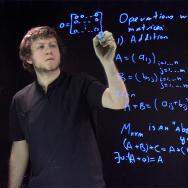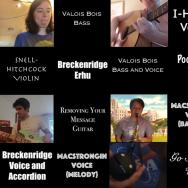At the start of Spring Quarter, University of Chicago students and faculty embarked on a remote learning journey. As the UChicago community engaged with the digital platforms, Lect. Marc Downie challenged his undergraduate students to push past the boundaries of technology.
Known for his virtual reality courses and earlier residency at The Richard and Mary L Gray Center for Arts and Inquiry, Downie believes that remote learning will provide students with an ideal venue for investigating technology. In his course, “New Media at a Distance,” students are working toward regaining control over technology during this experimental time.
“In the last month, suddenly everyone has come to understand the importance of being able to dismantle technologies and reassemble them at home in our own ways,” he said.
Students have designed new video effects or interactive games by investigating the code on the Zoom platform while encouraging different programs to interact with one another.
“Our first sketch was to come up with an interesting intervention on Zoom (audio or video), and in our third class everyone appeared on Zoom with different effects they had tried,” explained Neha Lingareddy, a third-year pursuing a major in computer science and a minor in media arts and design. “I did a motion-responsive and audio-responsive piece, where I was visible to others on Zoom only when I was moving or speaking.”
In class, revisiting historical tele-performance art has also provided a useful view on the COVID-19 crisis. “We’ve understood what those artworks were and stopped thinking about them for a while,” said Downie. “Now that we’re suddenly all online, it’s fun to look back at those pieces and wonder: Were these ahead of their time? Do they speak to our current moment? Are they completely redundant or just part of everyday life?”
At the end of the quarter, students will have the chance to contribute projects and ideas that may be integrated into A Labyrinth—a virtual game for the whole UChicago community made by Fourcast Lab. A Labyrinth has attracted 3,500 players to date and features online puzzles and quests paired with real-life collaboration. This spring, the game added new quests in order to provide members of the UChicago community with a shared space while individuals may be miles away from campus.
For Downie, working on digital projects like A Labyrinth and those his students have created remind him of why he finds new media so exciting. “Working with computation feels like discovery rather than invention,” he explained.
The class features students pursuing majors that range from art history to molecular engineering. “On the first day you discover that you’ve got two physicists, a chemist, three philosophers, two art students and someone from the French department,” Downie said. “Getting students to describe things like—this is what I care about, this is what I think is hard, this is what I think is important—and then trying to bridge those ideas is fantastically stimulating.”
Students in the course share Downie’s enthusiasm for exchanging a diversity of ideas and collaboration. “I worked in a group of three to create a piece that showcases the history of real-time audio-visual performances,” said Noor Amin, a first-year planning to study neuroscience and game design. “Each of us borrowed elements from different eras, starting from pixel art in the 1980s to 3D artwork in modern video-jockey performances.”
Outside of class, Downie is part of weekly conversations surrounding increasing the presence of production and art-making on campus. “We want to broaden the role of a scholar to someone who appreciates how things are made,” said Downie. “School is a great place to make things, and it’s important to realize that that might actually be the best thing that you could be doing.”
Although the move to online learning has been sudden, this quarter has allowed students to fashion creative tactics and demonstrate their resilience. “I think I’m starting to see the internet as a unique space," said Lingareddy. "Where we can not only replicate our physical experience, but also make creative, new and collective experiences.”
—This article was first published on the University of Chicago College website

